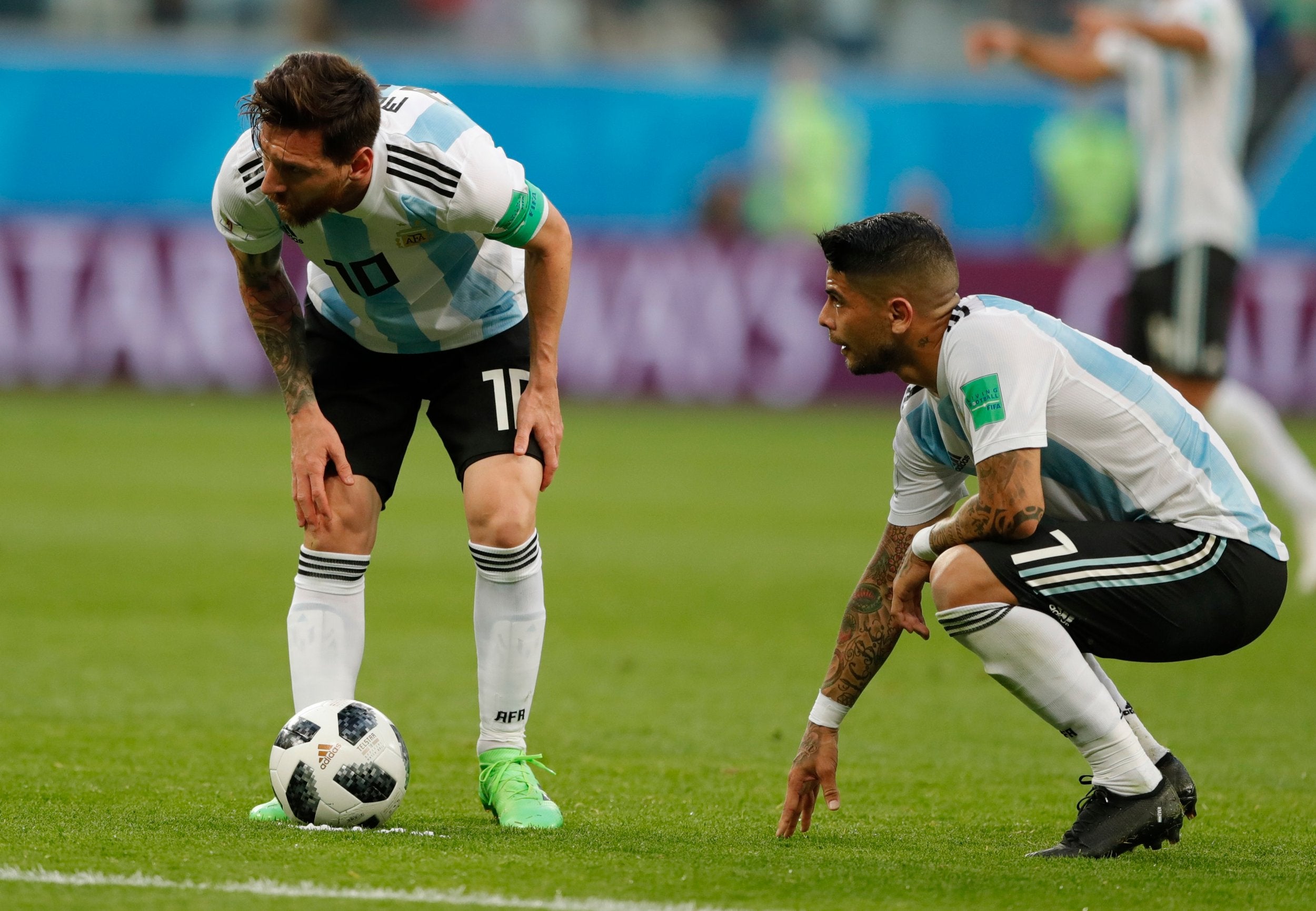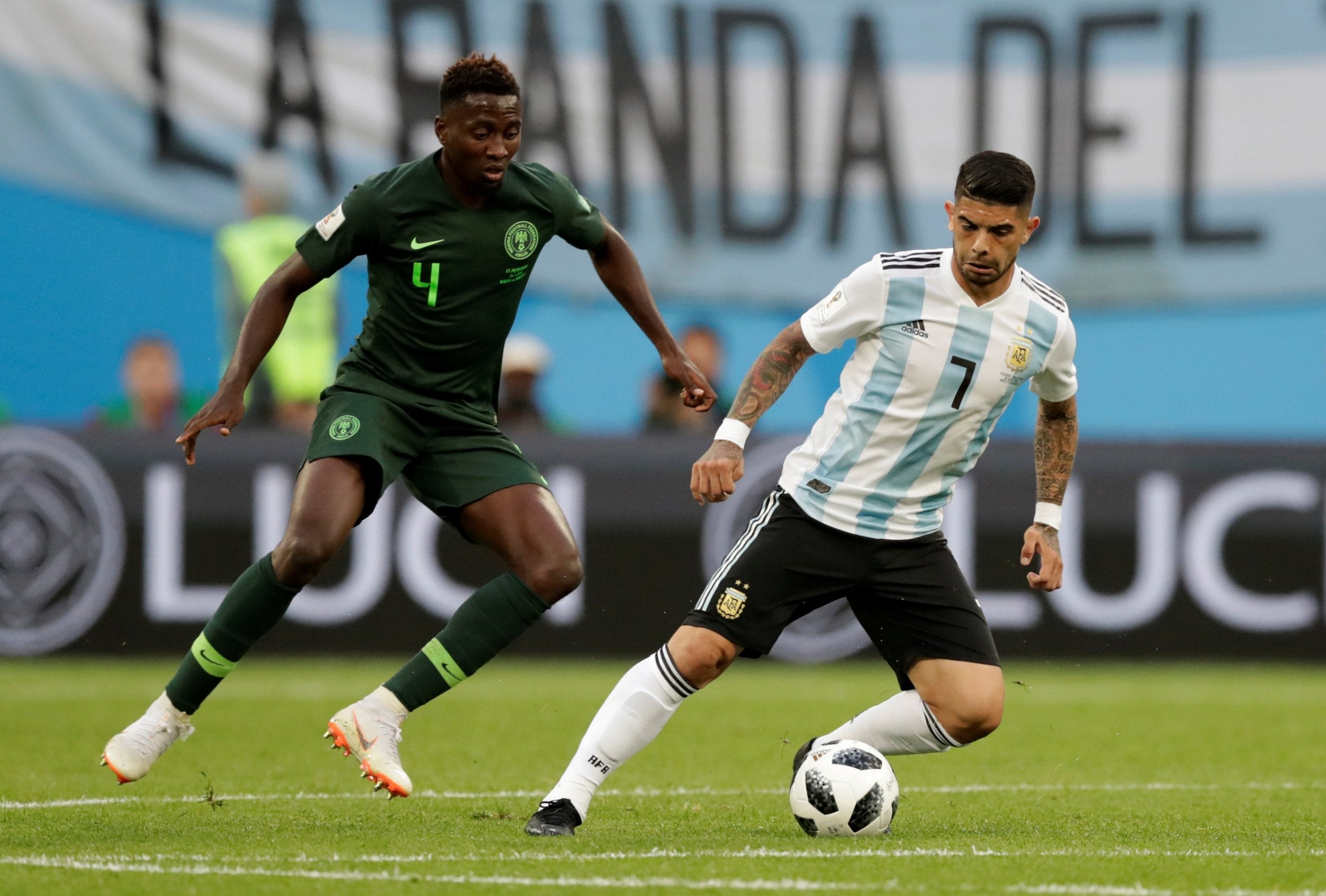An ode to Ever Banega, Argentina's maestro who makes Lionel Messi tick
Banega is one of those players who looks better the higher up the game he goes - maybe, at this World Cup, he may finally have found his level

Your support helps us to tell the story
From reproductive rights to climate change to Big Tech, The Independent is on the ground when the story is developing. Whether it's investigating the financials of Elon Musk's pro-Trump PAC or producing our latest documentary, 'The A Word', which shines a light on the American women fighting for reproductive rights, we know how important it is to parse out the facts from the messaging.
At such a critical moment in US history, we need reporters on the ground. Your donation allows us to keep sending journalists to speak to both sides of the story.
The Independent is trusted by Americans across the entire political spectrum. And unlike many other quality news outlets, we choose not to lock Americans out of our reporting and analysis with paywalls. We believe quality journalism should be available to everyone, paid for by those who can afford it.
Your support makes all the difference.You wonder, in an idle, playful, counterfactual sort of way, how things might have turned out if David Moyes had managed to sign Ever Banega for Everton in the summer of 2009. It was a lot closer to happening than many people remember: a work permit had been secured, a cash-strapped Valencia were desperate to get rid, and with Mikel Arteta injured, Moyes identified Banega as the missing piece of the puzzle, the man to bring silk and class to a team of oil-stained triers.
Unfortunately, there was one problem: Banega himself. Still only 21, desperate to win back his place in the Valencia side, and perhaps a touch underwhelmed at the prospect of playing alongside Phil Neville and Leon Osman, Banega stubbornly dug in his heels. “I still have many things to learn and show in Spain,” he said in public. In private, reportedly, he was a little more blunt. “The only way I’m leaving here,” he is said to have told one team-mate, “is in a box.”
In truth, Banega probably wasn’t ready for the Premier League. Or perhaps the Premier League wasn’t quite ready for him. Because for all his sublime qualities on the pitch - the intelligent pass, the light touch, that immaculate sense of control - off the pitch, it’s fair to say he was some way short of the finished article. Part of the reason Valencia were so keen to offload Banega was because of his shenanigans away from football, a wildness in all contrast to his immaculate composure on the field.
Whether it was heavy drinking, going out on the town several nights in a row, turning up for team meetings still half-asleep, being pulled over by police for drink-driving, getting caught pleasuring himself on a live webcam or being run over by his own car after leaving the handbrake off at a petrol station and breaking his leg in two places, Banega’s early forays in the game left coaches and potential suitors with one overwhelming sensation: that he was trouble.
And so for some years, the tale of Banega seemed fated to be one of a talent not wasted, exactly, but fettered. There were some glimpses of promise with Valencia, and others with the national side, but by the time Sevilla picked him up for a shade over £2 million in the summer of 2014, it felt like a final chance for a player who had just come off a six-month loan spell back in Argentina with Newell’s Old Boys: not so much Ever Banega as Now-Or-Never Banega.
That was also the summer in which Banega was left out of the World Cup squad for a second time in succession. It was not a universally popular decision - Lionel Messi, who had recommended Banega move to Newell’s in order to reawaken his love for the game and improve his chances of national team selection, was indignant. Angel di Maria, another close friend, is said to have cried.
Both knew that for all his issues, Banega was one of those rare players in the Argentina setup: a midfielder whose real gift was not to break up play but to build it, not to destroy but to create, not to chase but to escape. “Playing alongside Ever is a pleasure,” Messi once said. “With him we always get good balls played to our attackers. It makes everything easier.”

Banega’s performance against Nigeria in St Petersburg on Tuesday night offered ample proof of that. The headline figures - 79 passes, three chances created, both more than anyone else on the field - were impressive enough. But it’s how and where those passes were played that really made the difference. Against Iceland in Argentina’s opening game, Javier Mascherano played 23 passes to Messi, most of them short, simple exchanges in the middle of the field. Mascherano was effectively Argentina’s playmaker that day. You don’t want that.
By contrast, Banega may only have found Messi 16 times against Nigeria, but he did so in far more threatening areas: quick passes in the wide positions, vertical balls into the final third, and of course the sumptuous long pass from which Messi scored his spectacular opening goal. The fact that Banega can make passes other midfielders would not even attempt means Messi can stay further up the pitch instead of coming short. This is why he reportedly pushed so hard for Banega’s inclusion over the weekend.

In an article for The Guardian this week, former World Cup winner Jorge Valdano issued a withering attack on the culture of Argentinian football. “We welcomed in a world where huevos - balls - are more important than talent,” he wrote. “We saw that against Croatia. People were shouting at the players to show more huevos... that desire to fight turns every game in the Argentinian league into an indecipherable swarm, and where in the middle of it all, it can be hard to work out who the good player is.”
Valdano has always rated Banega, even enquiring about signing him when he was general manager of Real Madrid. And as Banega gently offered lucidity to a game that frequently threatened to descend into madness, you realised what he was talking about. Banega isn’t a talisman, in the classic sense of the term. He can’t carry a team on his own. In a sense, he’s only as good as the attacking players around him. You can certainly see how moving to Everton and feeding a staple diet of diagonal balls for Tim Cahill and Marouane Fellaini to knock down may not have the best use of his talents.
When we talk about players finding their level, we mean that as they rise through the game, they eventually discover their limitations. Banega seems different. Perhaps he’s one of those players who looks better the higher up the game he goes. Somehow, surrounding him with stars and giving up a well-organised defence to unpick seems to highlight his skills rather than diminish them.
He turns 30 on Friday, and the following day he will take the field against France in what promises to be one of the games of the tournament. After so many aborted starts, Ever Banega may just have found his level.
Join our commenting forum
Join thought-provoking conversations, follow other Independent readers and see their replies
Comments